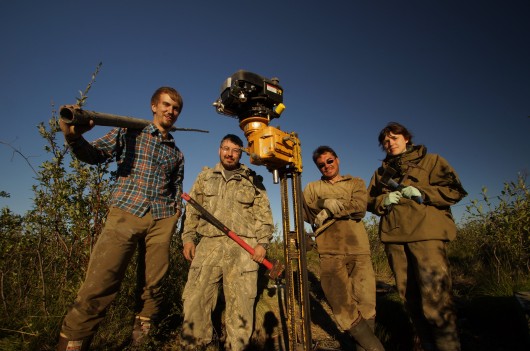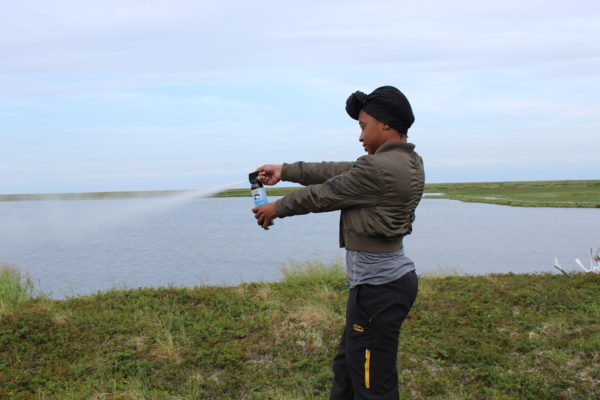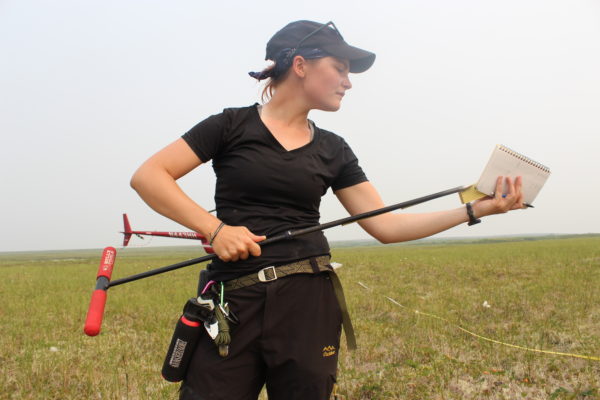When Heather Alexander tried to thank the Zimovs for hosting us at the Northeast Science Station, Sergey Zimov reprimanded her saying “We are all family, we do not say ‘thank you’ to family.” Today I leave one family to return to another.
It’s no easy task to sum up a month and a half in one blog post (perhaps that’s why we are supposed to blog often…) so I won’t. Instead, as I travel home, I’ll offer a few stories about my experience as a Russian permafrost driller.
First, a little background: This summer Polaris afforded me the opportunity to work alongside three fantastic Russian scientists as the sole foreign member of the permafrost team. Coming from a mostly aquatic background and knowing little more Russian than “da” and “niet” this was bound to be a unique experience. Our goal was to drill three 15 – 25 meter permafrost cores and to characterize the sediment quality, microbial activity and thermal state of these deep deposits.
Our first core took us to Pleistocene Park, where we stayed for a little over a week. As we loaded our equipment into “the 60” before our departure, conversation was all in Russian. Noticing my frequent “smile and nod” response, Valentine switched to English to say, “You better learn Russian fast.” I laughed uncomfortably. Valentine’s response: “No, really.” My thought: “Oh shit…” After that it was rapid-fire vocabulary. “Voda,” he would pause, “water.” “Lodka… boat.” “Vodka… vodka.” I learned my way around the dinner table. “Hleb… bread.” “Puchinya… cookie.” “Loshka… spoon.” And the drill site too. “Loshka… spoon/core barrel.” “Packiet… bag.” “D%&#… oh crap…”
Yes, I even learned some Russian four-letter words. Sometimes I simply asked, but other times I learned them in context. For example, a story:
Our drill is powered by a small gas engine with an appropriately sized gas tank – it doesn’t go long on a tank of gas. When we’re drilling deep, It’s important that the barrel is always turning to prevent it from freezing in place (If it freezes in place, the barrel and hole or lost… most of the time.) We were approaching 15 meters at our first hole (actually our second since we had already lost a hole at this site a few days earlier) and the engine started to sputter. Conversation stopped and Sasha, looked to Valentine. “Hadich” he said with reserved urgency, which means “go.” Valentine took off, crashing through the woods to get gas. It wasn’t long and the engine stopped. Sasha threw me a pipe wrench and instructed me to keep the barrel turning to the right. I gave the wrench a few tugs and it felt like the barrel was moving easily. We decided to pull it up rather than wait for the gas. We pulled up the first 5m, then the next 5m and finally the last 5m… there was no core barrel. (This is where I learned some four-letter words). We stopped for a second and together realized that I had in fact been turning the rod to the left, not the right… (Fact: I don’t know left from right). Sasha, a true master of his trade, gestured to put the rods back down the hole and, somehow, from 15 meters (50 feet) above, managed to thread the rods back onto the core barrel below. Sasha passed me the wrench again and this time I pulled the right direction. I couldn’t make it move. Timely, Valentine, a former power-lifter returned and gave it a go. With the sounds of a lion and the strength of a god, he went tumbling backwards as the barrel broke free. Twenty minutes later, the barrel was out of the hole and the hole was finished – just shy of 15 meters. We weren’t going to tempt fate by going any further.
Afterwards we celebrated our effort, I learned left from right, and we made jokes of my mistake(s). I’m extremely grateful for the warmth and wisdom (…and strength) of my permafrost family. I don’t know how to end this post without sounding sappy, so I’ll just end it with a photo.




